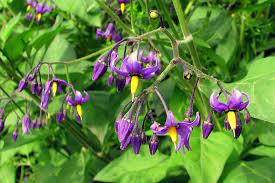
Dulcamara
Latin name: Solanum dulcamara
Short name: Dulc
Common name: Bittersweet | Woody Nightshade | Violet Bloom | Scarlet Berry | Felonwort
Primary miasm: Sycotic Secondary miasm(s): Psoric
Kingdom: Plants
Family: Solanaceae
- Symptomatology
- Remedy Information
- Differentiation & Application
Dulcamara is a climbing shrub in the nightshade family, bearing purple flowers and red berries. It contains solanine alkaloids, making it toxic in crude form. Used in homeopathy from the fresh stems and leaves before flowering.
Formerly used in folk medicine as an expectorant and anti-rheumatic agent. Historically applied for skin disorders, bronchial catarrh, and rheumatism.
Proved by Samuel Hahnemann; symptoms recorded in Materia Medica Pura and expanded in Allen and Hering.
- Mucous membranes – respiratory and urinary tracts
- Skin – especially in cases of eruptions suppressed by cold or damp
- Muscles and joints, especially after cold, damp exposure
- Bladder – cystitis, urinary retention from cold
- Eyes and face – particularly when affected by suppressed eruptions
- Glands, especially salivary, parotid, and cervical
- Warmth
- Dry weather
- Motion (especially in stiffness from cold)
- External heat (e.g. warm wraps)
- Open air (except damp or cold)
- Cold and damp weather
- Sudden temperature changes
- Suppressed perspiration
- Getting wet while perspiring
- Evening, night, and during rest
- Sitting still or lying on damp ground
- Exposure to cold after sweating
- Rhus tox. – Also rheumatic and better from motion, but more restless and hot
- Bryonia – Dryness and stitching pains, but worse from motion and lacks damp aggravation
- Calcarea carb. – Chilliness, glandular swellings, and damp aggravation, but more passive and sluggish
- Natrum sulph. – Ill effects of damp, especially asthma or head injuries
- Sulphur – Eruptions with burning and itching, but more psoric, messy, and reactive
- Complementary: Natrum sulph., Pulsatilla
- Antidotes: Camphor, Cuprum
- Follows well: Aconite (in acute cold exposure), Rhus tox
- Precedes well: Calcarea carb., Sulphur
Dulcamara is the remedy of damp chill—both environmental and emotional. Its patient is thrown off balance by nature, especially when the weather shifts from warm to cold, or sweat is suppressed. It represents a state where discharges, skin eruptions, and glandular activity are blocked, causing eruptions to be driven inward. Children and rheumatic patients particularly benefit from its sensitive response to weather and stagnation of secretions.
- Excellent for eczema, warts, or urticaria that flare in cold damp weather
- Use in rheumatic pains from sleeping on damp ground or wet clothes
- Key for cystitis or urinary retention after getting chilled
- Consider in autumn catarrhs, especially when discharges are thick and yellow
- Useful in chilblains, especially when red, itchy, or ulcerated
Mind
- Dullness, from cold
- Irritability in damp weather
- Obedient, overly submissive
Skin
- Eruptions, suppressed, leading to internal complaints
- Warts, smooth, flat
- Itching, worse warmth
Urinary
- Retention, after chill
- Involuntary urination in children
- Burning urination, scanty
Extremities
- Rheumatism, worse damp
- Stiffness, from cold
- Sciatica, damp aggravates
Generalities
- Damp weather, aggravates
- Motion, ameliorates
- Rest, aggravates
- Cold bathing, after, complaints from
Samuel Hahnemann – Materia Medica Pura: Original proving on chill, dampness, and eruptions
James Tyler Kent – Lectures on Homoeopathic Materia Medica: Provided key modalities and dull mental state
C. Hering – Guiding Symptoms of Our Materia Medica: Deepened understanding of glandular and urinary action
John Henry Clarke – Dictionary of Practical Materia Medica: Clarified skin, catarrhal, and damp-induced symptoms
William Boericke – Pocket Manual of Homoeopathic Materia Medica: Clinical applications in skin, joints, and bladder
